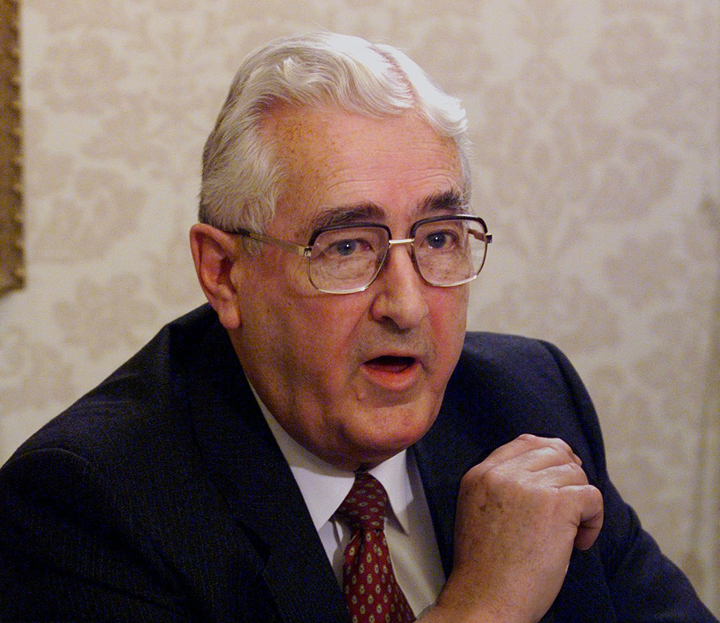VICTORIA – A former judge who helped engineer major child-welfare reforms in British Columbia and Manitoba says the overrepresentation of aboriginal children in government care across Canada is an “unconscionable national embarrassment.”

Ted Hughes said Thursday Canada’s federal, provincial, territorial and aboriginal leaders need to get together and develop a national strategy to reduce the numbers of aboriginal children in the child-welfare system.
Hughes urged the leaders to start work on the strategy when Canada’s premiers and territorial leaders hold their annual meeting of the Council of the Federation in August in Charlottetown, P.E.I.
“To Canada, a country that purports to be a leader in the advancement of human rights, both at home and abroad, the foregoing facts have to be a significant national embarrassment,” Hughes said during a speech in Victoria.
“The problem cannot be solved by Manitoba acting alone. Nor can it be solved by British Columbia acting alone.”
A spokesman in B.C. Premier Christy Clark’s office said efforts will be made to meet with Hughes prior to the Charlottetown meetings.
Of the more than 9,700 children in the care of child welfare agencies in Manitoba, more than 80 per cent are aboriginal, and the numbers have been increasing since 1997, Hughes said. In Winnipeg, 83 per cent of the 5,291 children in care in 2012 were aboriginal.
He said of the estimated 4,500 children in care in B.C., more than 53 per cent are aboriginal.
- Trudeau tight-lipped on potential U.S. TikTok ban as key bill passes
- Canadian man dies during Texas Ironman event. His widow wants answers as to why
- Hundreds mourn 16-year-old Halifax homicide victim: ‘The youth are feeling it’
- On the ‘frontline’: Toronto-area residents hiring security firms to fight auto theft
“The impact of these statistics is driven home when it is appreciated that in British Columbia in 2011 about 5.4 per cent of the population identified themselves as aboriginal,” said Hughes. “The fact of this dramatic overrepresentation is incontrovertible when it is appreciated that aboriginal people represent just over four per cent of the Canadian population.”
“Even in Winnipeg, where the figure is about 10 per cent and in Manitoba, where it is about 16 per cent, this disproportionate number of children in care is unconscionable,” he said.
Hughes conducted a public inquiry in Manitoba into the death of Phoenix Sinclair who died in 2006 under horrible circumstances at the hands of her mother and her mother’s boyfriend.
His report concluded that the province’s child-welfare system did not protect the five-year-old aboriginal child from her parents, who were both convicted of first-degree murder. The report prompted a major overhaul of child welfare in Manitoba.
Hughes said the findings and recommendations from his Manitoba report conclude “that responsibility to protect children is a shared responsibility — shared with the child-welfare system itself, and with other arms of government and with the community as a whole.”
In 2006, Hughes delivered a report on B.C.’s stretched child-protection system and its unmanageable degree of change that prompted the Liberal government to create an independent body to oversee and monitor children’s issues.
The post is currently held by former Saskatchewan judge Mary Ellen Turpel-Lafond who is B.C.’s independent Representative for Children and Youth.
Hughes said he supports Turpel-Lafond’s aim to ensure B.C.’s ministry for children and family development take the leadership role in closing the gap facing aboriginal children, but a national approach is required.
“A provincial initiative will neither rectify nor reverse what I have characterized as ‘unconscionable’, a ‘gross disproportion’ and ‘a national embarrassment.’ I refuse to accept that it will indefinitely remain as such. There has to be a solution. This is a serious problem that needs to be tackled at a national level.”
After the speech, he said he knows what he would tell Prime Minister Stephen Harper about the issue.
“I would make the case why the feds have a major role to play to get to work on what I am suggesting is a re-look at some of the decisions they have made over the years that have resulted in these out of whack statistics,” he said.



Comments